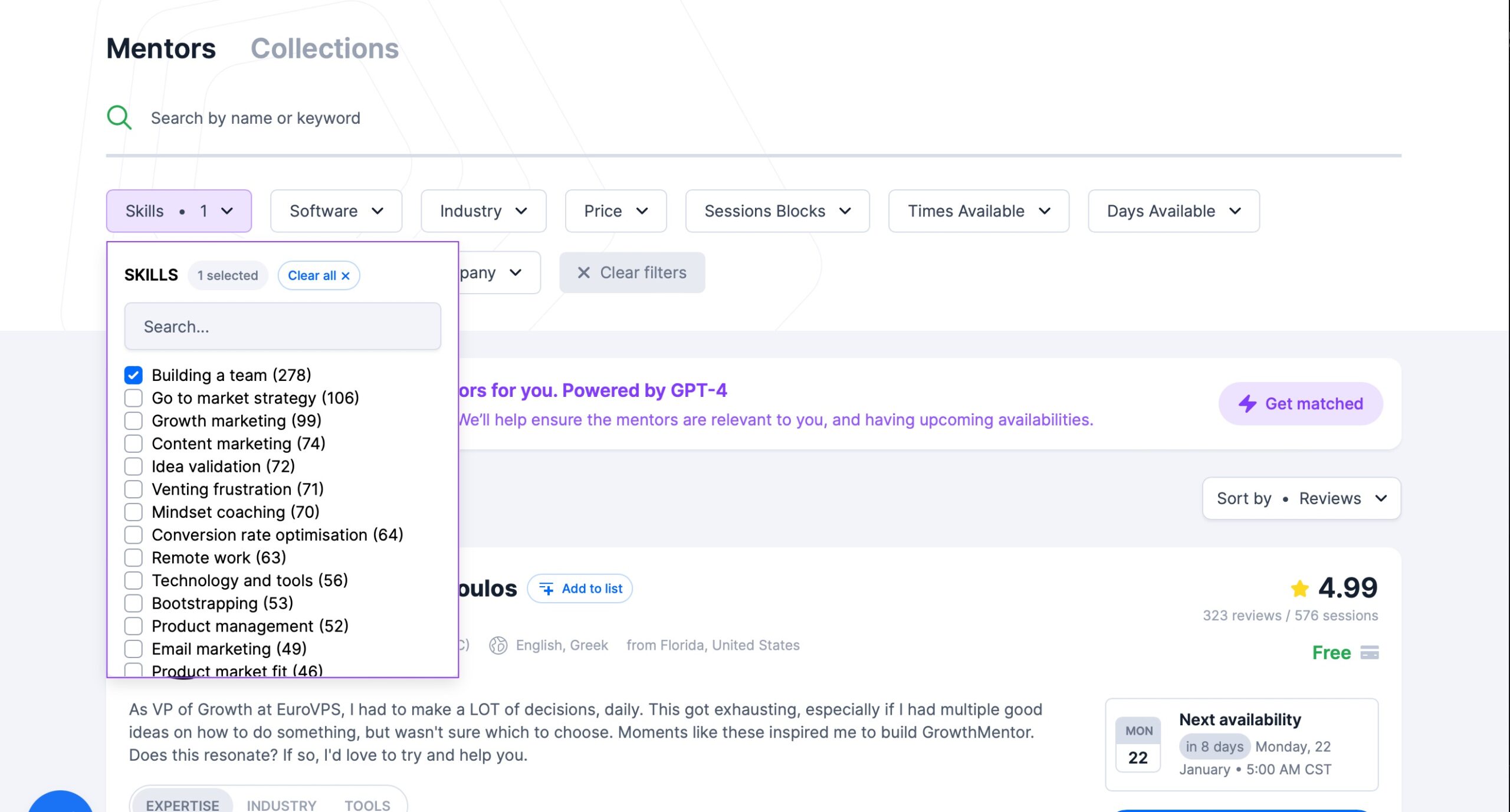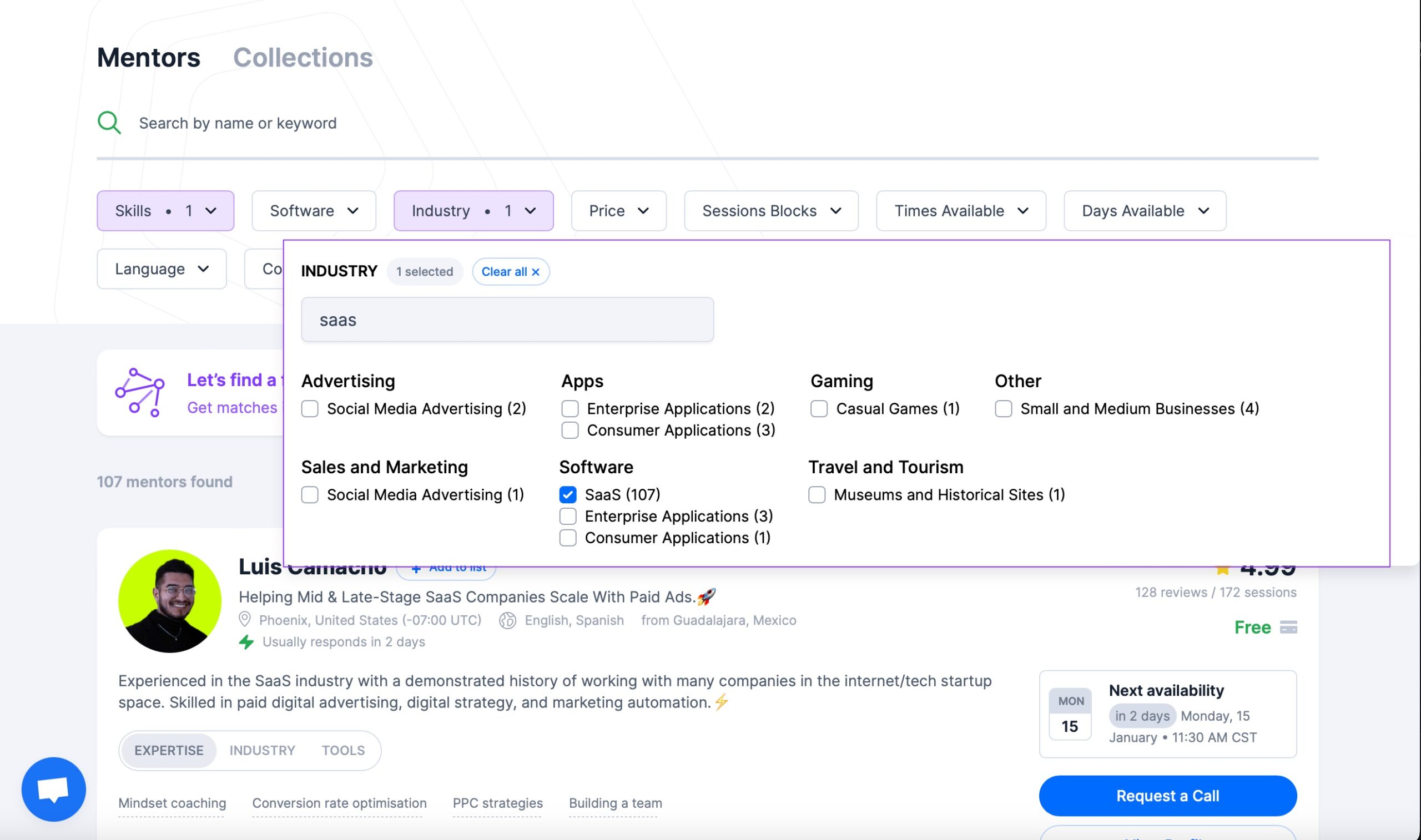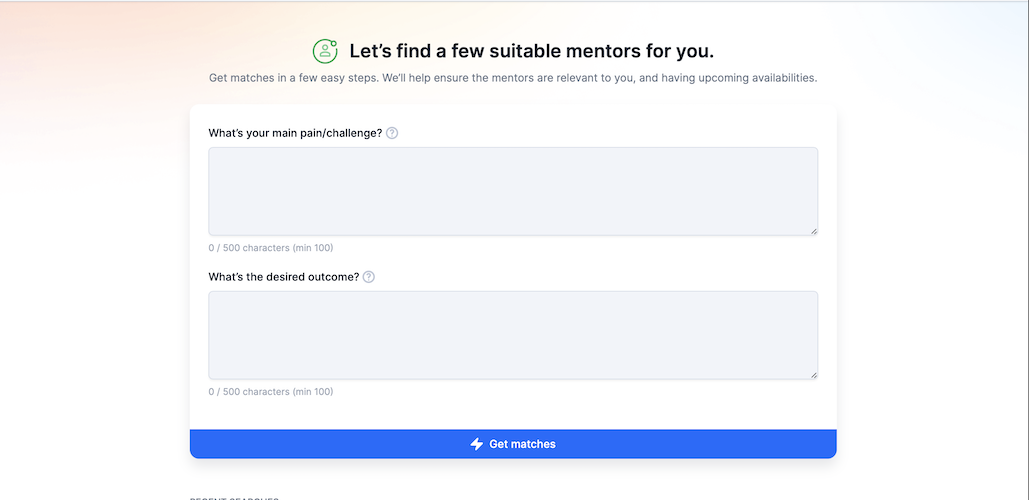How to Find a Mentor For Your Startup (Message Templates Included)
Founders, if you’re feeling like your startup is stuck or that you’re losing your gut feeling for what the “right” answer is, it may be time to find a mentor.
But, that’s easier said than done.
If you’re not sure where to start your search, you’ve come to the right place. Read on for our step-by-step guide on how to find a startup mentor.
How to Search for a Mentor
We’ll start off by saying there is no magical list of traits that will ensure a mentor is a good fit for you and your startup. Yes, experience in your industry and an understanding of a startup’s needs for your maturity level matter. Yes, soft skills matter.
But, a mentor may have all of those and still not be a good fit.
Ultimately, your relationship with a mentor is no different from any other relationship. It’s going to be based on any number of intangible factors that determine if the two of you “click” or not.
However, there is some homework you can do ahead of time to narrow your search to people you are more likely to click with. Let’s cover some do’s and don’ts.
Here’s what not to do:
DON’T: Get caught up in pursuing a mentor solely because of the companies they worked for. Sure, it can be amazing if someone has worked at a Fortune 500 company or a unicorn that seemed to break out overnight. But what worked for those companies may not work for your startup.
DON’T: Prioritize possible mentors due to their reputation. We know. It’s easy to get starry-eyed if you meet a big name at an event. But just because a potential mentor is well-known doesn’t mean they’re going to be a good mentor for you.
DON’T: Blindly follow every single channel a potential mentor has simply because you’ve heard they’re “the best.” You want to consume a possible mentor’s content critically and see if it really resonates with you.
If that’s what you shouldn’t do, here’s what to do instead:
DO: Look for potential mentors who you admire and whose paths mirror where you’d like to be in the future. This is all about being authentic and really asking yourself what you want for your startup. Becoming a unicorn is a noble goal, but is that really what’s going to make you happy or are you dazzled by the limelight?
We hear about the hyper-growth wunderkind founders all the time. But there are hundreds if not thousands of founders who have built amazing, stable, sustainably growing companies that you’ll rarely see lauded in tech news. So think through what you want and find a potential mentor whose path could serve as a blueprint towards your goals.
DO: Look for potential mentors whose background, skill-sets, industries, and beliefs are similar to yours, but not carbon copies. It’s great to sit down and talk shop with someone who knows your industry and shares the same strengths.
But, you want your mentor to push you a little outside of your comfort zone, without feeling like they’ve shoved you out of it. So just enough similarity, usually along the lines of industry and startup maturity, is the key.
DO: Consider the personality of your potential mentor and whether it works well with your preferences. Mentorship comes in all different styles: straightforward, cheerleading, guiding, even questioning. Most of the time, you’ll have a preference for one or two styles. By engaging with a potential mentor’s content, you’ll usually get a good grasp of their personality and likely mentoring style fairly quickly.
Where to Look for a Mentor
Now that you know how to search, let’s cover where to look for a mentor.
Typically, you’re going to find mentors either through your local network, in-person events, or some form of online connection.
Your Local Network
We always suggest starting with your local network when it comes to making any kind of connection.
Why? Because it’s just easier. Unless you’ve been doing all your networking online for years, you’ll know people locally. You likely have a reputation among your business peers.
And in general, people are much more likely to say yes to informational interviews (more on that a bit later) from someone they were introduced to by a colleague or met in-person at an event.
“But I don’t live anywhere ‘techy,'” you may complain. “There’s nothing happening in my area.”
Double-check. You’d be surprised at how widespread the startup community is, even in much smaller cities.
But if not, you always have the next option:
Regional Events and Conferences
If your local area isn’t a bustling tech hub, there’s a good chance a nearby larger city will have plenty going on.
Start looking at events and conferences in your region!
We recommend starting nearby simply because it lessens the expense with travel costs etc. and being from the same region can be a powerful form of connection with a potential mentor.
You can, of course, look at industry conferences and events as well. But aim for ones that aren’t quite as well-known. The super popular events tend to focus primarily on workshops and panels, leaving you precious little time for networking.
Plus, the more people at an event, the higher chance a potential mentor is going to be burnt out on networking (because if you want to talk to them, a dozen other people probably do as well).
In the world of online mentor connections, LinkedIn is solidly your best bet. It’s known as a business network and people are used to connecting with people they don’t know IRL.
But that also means it’s very difficult to stand out when cold-contacting a potential mentor.
If you start with 2nd and 3rd degree connections, you’ll have a much higher chance of success. Also, don’t be afraid to either ask your first degree connections for a warm intro or ask if there’s anyone they think would be a good fit to mentor you.
But if it looks like you’ll have to take the cold-contact approach, don’t worry and keep reading. We’ll cover how to do it right in just a bit.
X (Twitter)
X shares most of the same advantages and disadvantages with LinkedIn and there’s not a huge difference in how to approach contacting a potential mentor between the two platforms.
The main reason you would choose this platform over LI is simply down to industry preferences. For certain areas, X is “the place to be,” while LI is totally ignored.
So don’t fight the flow: go where people in your industry typically hang out.
What Not to Do When Contacting a Mentor
Before we jump into how to contact a mentor, let’s cover some of the super common mistakes that will get you ruled out fast.
Here are the main ones:
- Asking for mentorship too quickly
- Not asking for mentorship at all
- Being insincere
- Asking for too much
- Not knowing what you want
In the case of mistake #1, you don’t want to ask for mentorship the first time you contact someone. The direct approach may work for sales and outbound, but here, you need to let the potential mentor get to know you.
Then on the opposite side of the spectrum, you don’t want to be the person who keeps contacting a potential mentor without eventually being forthcoming about wanting them to be your mentor. But, if you keep reading, you’ll get exact scripts on how to ask, which should help ease your nerves.
For mistake #3, of course, honesty is always key. Potential mentors will know if you’re not genuinely interested in them or their work. So don’t try to game the system. Find a possible mentor whose work genuinely captures your attention.
The next one is tricky because it’s hard to know what is expecting too much. In general, a good rule of thumb is meeting your mentor once a month for an hour or twice a month for a half hour is a perfectly reasonable start. If things continue to work well, you can always ask your mentor if they’re open to meeting more frequently.
Finally, make sure you know what kind of help you want and with what issues before you talk to your potential mentor about mentorship. As soon as you broach the subject, your potential mentor may want to know what your expectations are and what you want to accomplish. Better to be prepared than caught on your back foot.
How to Make the Ask
Next up, the nerve-wracking part: actually contacting your potential mentor.
Whether you do this online or in-person, things are going to follow the same general script. We’ve included a few templates to make things run more smoothly.
Just make sure to modify them to suit your voice—you don’t want anyone thinking you’ve ripped a template or asked Chat-GPT to write the message for you because it doesn’t sound like you.
Your outreach to a mentor is a four-step approach:
- Initial outreach for an informational interview
- Informational interview
- Followup
- Making the mentorship ask
Keep in mind this is simply an outline. As is true of any form of networking, your situation may vary. Don’t feel compelled to stick to the exact schedule and scripts given here if the conversation and connection are going well.
Step One: Initial Outreach
For your first outreach, you’re going to contact your potential mentor with a short message and a small ask. The golden rule? Keep your ask minimal! You want to send something like:
However, you’ll want to add some personalized flourishes throughout the template. Look at how this looks in practice and compare how the language changes slightly:
Now, most of the time, if you’ve done your homework, you’ll get a positive response from the potential mentor.
If you don’t, don’t despair. Simply continue your search. With persistence, you will find someone who’s open to chatting with you.
Step 2: The Informational Interview
Once you get a “yes,” get a time scheduled with your potential mentor right away and start preparing for the informational interview. Think of this chat as “picking the potential mentor’s brain” (but we wouldn’t recommend saying that outright. Some people have a particular distaste for the phrase).
You want to make sure to have plenty of questions, but realize you may not get all of them answered during the session.
Remind yourself to take a minute or so at the start of the interview to say hello and be conversational. You don’t want to waste the potential mentor’s time with too much chit-chat, but jumping straight into: “let’s get to work” can be off-putting.
During the session, have a place to take notes easily accessible. You don’t want to forget anything they told you, especially if they’ve suggested specific action items.
And finally, the most important part: remember to take a deep breath and relax before you jump on the call. Block out some buffer time before the call to ensure you don’t feel rushed or nervous. You’ll come across as much more professional and polished if you’re calm.
Step 3: Follow Up
Hopefully, the informational interview has gone well! However, regardless of whether it did or not, it’s simply courteous to follow up with your potential mentor.
The first should be a message or email ~24 hours after the session as a thank you:
In practice, this might read like:
From here, you want to implement the potential mentor’s recommendations. Optimally, you want to implement as much as possible within 2-4 weeks. Longer than that and you risk the potential mentor forgetting who you are (especially if they’re incredibly busy and meet with a lot of people).
But, it’s not always possible to wrap an entire project. Some efforts are bigger than others. Simply aim to do what you can within this 2-4 week timeframe.
Then, after you’ve implemented their recommendations, you’ll follow up again with another message, like this:
When you write the message, it will probably look more like:
This email ties everything up nicely because it shows:
A. You took initiative and implemented their recommendations
B. You got results from it
C. You were willing to update them on your progress
Everything above goes a long way towards demonstrating the kind of mentee you’ll be. You’ll prove you’re willing to take advice and learn from it, which is one of the biggest benefits a mentor gets out of a mentoring relationship.
Making the Ask
Finally, you can get on to actually asking for mentorship.
Most likely, your potential mentor will have replied to your previous emails in some fashion. If you included a “no need to reply” in the first, rely on the response to the implementation email to guide you (though often potential mentors will respond to the first email even if they’re not obligated to).
If this is the case, you’re definitely good to make the ask within a week or so of getting the reply to your implementation update email.
But if your potential mentor hasn’t responded to any of your messages, we suggest waiting a couple of weeks, then sending the ask. Sometimes it’s simply a case of the potential mentor being very busy or assuming they didn’t need to reply to the update email.
Either way, your approach will be the same:
This is the most templated of all the emails, so there’s not too much to insert when putting it into practice:
It’s pretty unlikely that a potential mentor who has A. taken the time to meet with you beforehand and B. seen the results you achieved from taking their advice will turn down your mentorship ask at this point.
But, it can happen. Sometimes people are simply too busy. Sometimes they’re dealing with their own form of imposter syndrome.
Regardless of the response, be positive, professional, and gracious. Even if you’ve been turned down, you never know when that connection may come in handy down the road.
The Shortcut Method to Finding a Mentor
Now, there is a way to shortcut all of this time, effort, and message writing in finding a mentor.
Just join GrowthMentor. It’s the faster, easier, and less risky way to find a mentor.
We’re a mentorship platform focused on marketing, growth, and product within the tech space. We have almost 700 mentors who have been vetted by a super-strict process.
And it’s all available for $99 per month for three calls per month or $199 per month for unlimited calls.
Plus, 85% of our mentors don’t charge any extra fees. They’re here to help a stranger out for free.
We hear you: paying for a mentorship platform seems icky or inauthentic somehow.
But, you’re not paying for the mentorship (well, unless you book with one of the less than 20% of mentors who charge an extra “startup friendly” fee.)
You’re paying for:
- Access to a directory of almost 700 mentors who have “been there and done that.”
- AI matching that can narrow the pool of mentors from hundreds to a handful in just a few minutes
- Help requests that let mentors come to you to solve your problems
- Regular community learning events that are built from what the community requests
- Involvement in a super-helpful community with a “give-first” spirit
Not to mention, what feels weirder: paying for a mentorship platform where mentors are ready and eager to help you with your challenges or spending weeks or even months building a relationship with the sole intent of asking someone to be your mentor?
Our plans are designed to encourage booking multiple calls with multiple mentors so you can get a ton of different opinions from various angles and industries.
And if you want to work with a mentor long-term? Just ask them if they’re cool with it! We don’t focus on long-term mentorship so we have absolutely no problem with mentor-mentee pairs going off platform for longer term arrangements.
Take a look at how it works:
How to Find A Startup Mentor Through GrowthMentor
First, you’ll want to visit the “browse mentors” page. You could just start scrolling.
But, since we have more than 600 mentors, you’ll want to narrow down your options first.
Within our mentor search, you can apply filters to search for mentors with specific skills, software expertise, industries, or current and former companies. There are 275 different software areas to filter by, 30 skill areas, 300 industries, and more than 100 mentor companies.
For example, let’s say you’re facing questions about building a team for a SaaS industry company and you want a mentor with experience in both of those areas. All you have to do is check “Team Building” under skills, for 278 mentors:
And then, after a quick search for “SaaS” under “Industries”, check that box to narrow your field down to 107 mentors:
We usually recommend applying no more than 2 filters at a time, as certain filters (such as a mentor’s previous or current company) can pinpoint fairly specific results.
But in some cases, your filters may still yield a fairly large pool of potential mentors, like our 107 SaaS mentors with team building experience above.
To focus your options even more, you can search for specific keywords in our general profile search. Within our “SaaS” and “Team Building” filters, a search for the keyword “app” produces 39 mentor options, a search for “founder” yields 47 options, and a search for “accelerator” produces 15.
From there, it’s just a matter of browsing your options and determining which mentor seems like the best fit for you.
However, sometimes you’re in the throes of decision fatigue and simply don’t have the time or energy to sort through even five or ten mentor options.
Situations like these are exactly why we built our new AI matching engine:
Simply describe your primary pain-point, add your desired outcome, and in a matter of minutes, you’ll be matched with three different mentors who will be a great fit to help with your challenge.
Then, it’s just a matter of booking your call and asking your questions. You could chat with mentors like…
Startup Mentors to Chat with on GrowthMentor

Dir. Product & Experimentation | I help you prioritize and make data-informed product decisions.
Mentoring Style: The guide. Will listen to your situation carefully, work through solving the problem with you, and help you get clarity on the decision you have in front of you.
Book A Call With John If:
- You’re looking for a collected, insightful approach to the world of CRO and experimentation.
- You need help designing experiments or measuring hard-to-quantify metrics like customer satisfaction.
- You need experienced guidance on how to build experimentation culture and innovation into your business.
- You’d like for your mentor to be laser-focused on problem solving, but have an optimistic calm vibe while doing it. And your goal is to walk away with clarity and confidence in your decisions.

Head of B2B Marketing@Zattoo, scaleup advisor, repeat founder, compulsive helper
Mentoring Style: The inventor. Will ask lots of questions to understand your mindset and approach, then prompt you with innovative ideas and fresh approaches.
Book A Call With Hanns If:
- You need a solid grounding in the B2B marketing space.
- You want a mentor with marketing experience both from the founder side and the marketer side.
- You need a very well-rounded mentor with experience across a broad range of marketing niches.
- You’d like for your mentor to shoot straight and provide out-of-the-box ideas, all while being patient in helping you refine your understanding of the challenge.

Grew your startup from 0 to 1 and got stuck at 1? 👉 I’m your gal 😎 | Demand-Gen Wizard 💥 | Creator 🎨
Mentoring Style: The cheerleader. Will help you break down your process into manageable steps and build your confidence to tackle them.
Book A Call With Justyna If:
- Your startup is feeling “stuck” at 1 and you want to get unstuck.
- You want to absolutely crush your personal branding on LinkedIn.
- You want to shake up your thinking with creative approaches.
- You want an energetic mentor who can shoot straight, lay out frameworks, brainstorm out of the box ideas while still cheering you on towards success

No bull$hit advice for new SaaS founders perfect your 1st profitable Go-to-Market📈 Ex-Reuters: Launched in 10+ markets 🌏
Mentoring Style: The sharpshooter. Will listen to your challenge, dissect it, then help you pull together a laser-focused path to smash through any hurdles in your way.
Book A Call With Richmond If:
- You’re a first time founder with product launch jitters.
- You want product management advice from a holistic, whole business perspective.
- You need specific advice regarding achieving and maintaining PM fit.
- You want your mentor to have a no-nonsense but positive attitude and are energized by working with someone who’s relentless about breaking down business barriers.

Product & Growth Leader, Former Director @ Shopify
Mentoring Style: The sage. Will listen carefully to your challenge, then take an evenhanded, collected approach and ask plenty of questions to prod your thinking and open up your mind.
Book A Call With Nick If:
- You know you need to build a product team from the ground up.
- You want your mentor’s approach to be informed by a wide breadth of industries and business sizes.
- You’re itching to understand the more technical aspects of product management, but aren’t fluent in engineer-speak and need your mentor to act as a translator of sorts.
- You want a down-to-earth mentor who’s been on the engineering, founder, growth, and PM ends of business and uses that depth of experience to provide systematic, targeted advice.
So if the thought of getting a mentor on your own seems intimidating, join GrowthMentor and get connected with almost 700 mentors who are all more than happy to help you with your challenges.
Find Your Business Mentor







